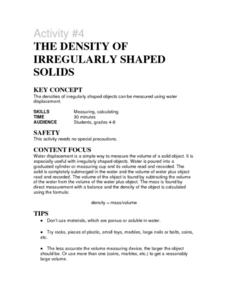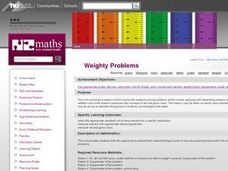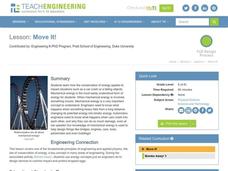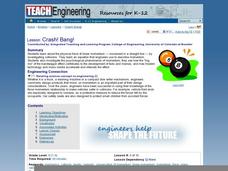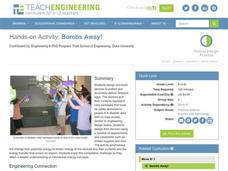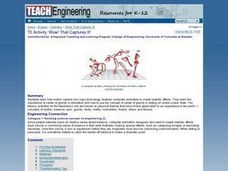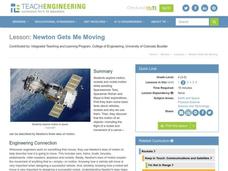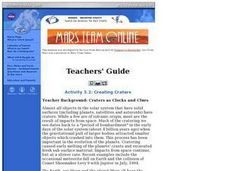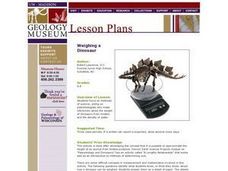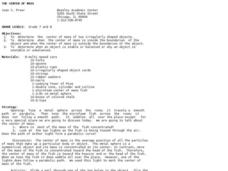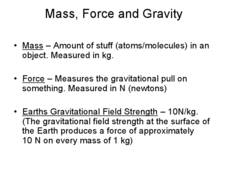Curated OER
To Float or Not to Float, That is the Question?
Ninth graders develop operational definition of density, do computations using density equation, categorize pieces of matter as being able to float on
water or not, based on density, explain why some objects sink or float based on...
Curated OER
Making Cents of Density
Middle schoolers utilize their knowledge of the physical properties of matter such as mass, volume, and density to solve a problem. They utilize the scientific method to solve a problem. Pupils analyze their data to determine whether...
Curated OER
Hovercraft
Students assess human impact on water quality. They determine how the force of friction retards motion. Pupils describe and measure quantities that characterize moving objects and their interactions within a system: Time, Distance,...
Curated OER
Activity #4 The Density of Irregularly Shaped Solids
Students comrehend that water displacement is a simple way to measure the volume of a solid object. They pour water into a graduated cylinder or measuring cup and its volume is read and recorded. Pupils the volume of an object by...
Curated OER
Activit #2 Matter: Is It Conserved?
Students support the law of conservation of matter with evidence. They discuss the changes observed from the burning of the candle, and the differences in mass which are observed when the same reaction is carried out in an open or...
Curated OER
What State Are You?
Students identify three states of matter and recognize plasma as fourth state. They provide examples of matter that are classified in particular state and identify properties of each state of matter.
Curated OER
Mass: Applying and Interpreting
Students rotate through six studying stations solving problems that involve applying and interpreting aspects of mass. They solve various word problems, and measure the contents of cans and calculate the mass of two cans.
Curated OER
Move It!
Students observe a demonstration presented by the teacher covering different types of energy. They participate in an experiment where they study numerous physics vocabulary words and visit websites that demonstrate examples of these...
Curated OER
Forces and Graphing
Students analyze graphs to determine relationships between variables and rates of change. They determine the basic concepts about static reaction forces. They determine the slope and equation of a line.
Curated OER
Crash! Bang!
Young scholars study the physical force of linear momentum by investigating collisions. They analyze the difference between elastic and inelastic collisions. They calculate linear momentum.
Curated OER
Bombs Away!
Students design and build a device to protect and accurately deliver a dropped egg. They review and study a number of vocabulary words that are associated with this lesson. They work in a small group in order to develop a successful...
Curated OER
TE Activity: Wow! That Captures It!
Students examine how motion capture technology allows computer based animators to design realistic effects in animation. They study how the center of gravity contributes to animation and how to use the center of gravity to write an...
Curated OER
Terror in Space
Students view a video clip about the role of satellites in space. They examine the concept of center of mass. They participate in an experiment showing how altering the location of an object's center of mass can change its motion.
Curated OER
Newton Gets Me Moving
Students discuss Newton's laws of motion. The conduct motion experiments by building "Newton Rocket Cars" from assorted materials. They propel the cars with rubber bands and wooden blocks and record the distance traveled on data sheets.
Curated OER
What Floats Your Boat?
Students are introduced to the concept of buoyancy. The Video used in this lesson demonstrates and explains the characteristics of objects that sink and float. It presents the concepts of displacement, weight, and buoyancy.
Curated OER
Density Derby
Students explore the relationship between mass, volume and density. They use model boats to discover how changing mass and volume affect density. This is a very engaging lesson which provides great demonstrations and hands-on activities.
Curated OER
Density And Volume
Sixth graders explore the concept of density as a relationship of an object's mass to its volume. Densities of a variety of objects are compared and used to identify an unknown object.
Curated OER
Creating Craters
Students explore parts of an impact crater and compare and contrast craters found in Earth, the Moon, and Mars. Crater formation is modelled and the relationship of mass, velocity, and size of the projectile to the crater formation is...
Curated OER
Weighing a Dinosaur
Students role play as paleontologists who make inferences about the weight of dinosaurs. They use models and the density of water to make these inferences.
Curated OER
What's the Matter? (Grades 6-7)
Students explain the physical properties of matter. They, in groups, perform a variety of experiments, each demonstrating a different property of matter. A very nice, hands-on lesson!
Curated OER
MASS
Students distinguish between weight and mass. They examine how in oscillations of a mass against an elastic spring--in the absence of gravity, or in horizontal motion--the length of the oscillation period is proportional to the square...
Curated OER
The Center of Mass
Students determine the center of mass of two irregularly shaped objects, determine when the center of mass is inside or outside the boundaries of the object, determine when and/or why an object is stable, balanced, unstable or unbalanced.
Curated OER
Newton's Laws
Beginning with definitions of mass and foce, this excellent set of slides summarizes Newton's Laws of motion and universal bravitaions. Components of each law are explained along with examples and questions to inspire discussion. This is...
Curated OER
Mass, Force, and Gravity
Definitions of gravity and weight and the calculations involved with their manipulation are covered here. The equations and resource links will be valuable to show a physics class. Use it as a note-taking support for your lecture on...





